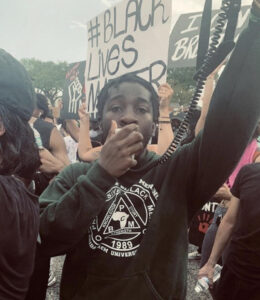
Jeremiah Nichols considers himself a revolutionary and a visionary, someone who sees a future and doesn’t stop until it manifests. He has always felt the need to fight for the men and women who look like him, but he admits he hasn’t always known how. Fueled by the hardships of being a Black man in America and the racial conflict of this generation, he has discovered his purpose with a determination to fulfill it, by any means necessary.
Nichols started his journey with a major academic change. After one semester as a businessadministration studentat Florida A&M, he knew it would not help him better understand the Black community and become an advocate on its behalf. So, he switched his major to African American studies, a decision that was not strongly supported by his family and friends.
“They didn’t know the possibilities, so I don’t blame them,” Nichols said. “But almost everyone told me it was a huge mistake. I responded by following my dream and letting the criticism motivate me to be a better person and prove them wrong.”
Despite several people betting against him, Nichols did exactly what he set out to do. He proved them wrong.
In the span of a few months after changing his major, Nichols developed a non-profit organization in Tampa, his hometown, called Ubuntu. The name, Ubuntu, comes from an African saying that translates to: “I am, because we are.”
With this proverb in mind, Nichols created his organization with the purpose of uplifting Africans, not only in America, but worldwide.
“Ubuntu is the fruit of my learning,” Nichols said. “My organization is built upon my major and what I have learned, whether it concerns politics, economics or history.”

The goal of Ubuntu, as Nichols describes it, is to educate Africans on their history, improve housing conditions in low-income Black neighborhoods and push for criminal justice reform. Nichols and his Ubuntu organization have successfully made strides toward these achievements in Tampa by starting a community garden that gives back to its residents and partnering with the Hillsborough County School Board to initiate a program to teach African American history in high schools.
He has now brought his organization to FAMU and plans to continue the fight for revolutionary change in Tallahassee. Nichols has upcoming events discussing how women impact the Black Lives Matter movement, African Americans in the LGBTQ+ movement and a few classes on protecting yourself during protests and demonstrations.
Recently, Nichols was able to put into practice one of his self-defense programs to protect a friend in need.
“I had my first encounter with a Tallahassee racist and it was so intimidating,” Shania Sallye, a second-year bio pre-medicine major, said. “He had a Trump flag and an American flag flying from the back and a Confederate flag license plate. Jeremiah [Nichols] immediately called me to see where I was.”
In response, Nichols was able to protect Sallye by sending men from his organization to escort her home safely and then ensure she felt secure and comforted. Protecting Black women has always been of the utmost importance to Nichols and he hopes to continue to ensure the women around him feel safe in such a trying time.
Nichols explained that in the past few months, his entire outlook on life has changed and he has had to completely alter his lifestyle. He now spends most of his time reading and educating himself on how to best approach the injustices he sees in the Black community rather than going to parties or social events like most college students.
“Believe it or not, the modern revolutionary’s job is reading, going through emails, creating plans and starting programs,” Nichols said. “It’s not always marching and demonstrating. I am basically trying to create a blueprint for the next generation to come.”
On average, he reads about 20 pages of material each day from prominent Black intellectuals, writers and psychologists. He also encourages his friends to stay updated on current events and learn from many of his favorite authors.
“I had the pleasure of starting Jesuit High School’s first African American Club with Jeremiah during our senior year,” Robert Morrison, a longtime friend of Nichols, said. “From that experience alone, he propelled me to learn more about my culture and history just to keep up with him.”
Morrison has been a confidant to Nichols for many years but says that he has grown from their friendship and become a better person through their shared experiences.
“[Jeremiah] has taught me how not to be afraid to speak my truth on any topic and that we can’t go anywhere in the future if we don’t truly understand our past,” Morrison said.
This is just the beginning for Nichols. Even though his organization is still small, he has plans to bring in many more students with some of his programs and events on campus. Some of his upcoming events include an all-female panel discussion titled “The Struggle Within the Struggle” on Oct. 28 and a movie night showing “The Death and Life of Martha P. Johnson” documenting the life of a transgender Black woman.
To get more information on Nichols and Ubuntu, you can follow him on Instagram @jaynichols_x and his organization @ub.bun.tu.